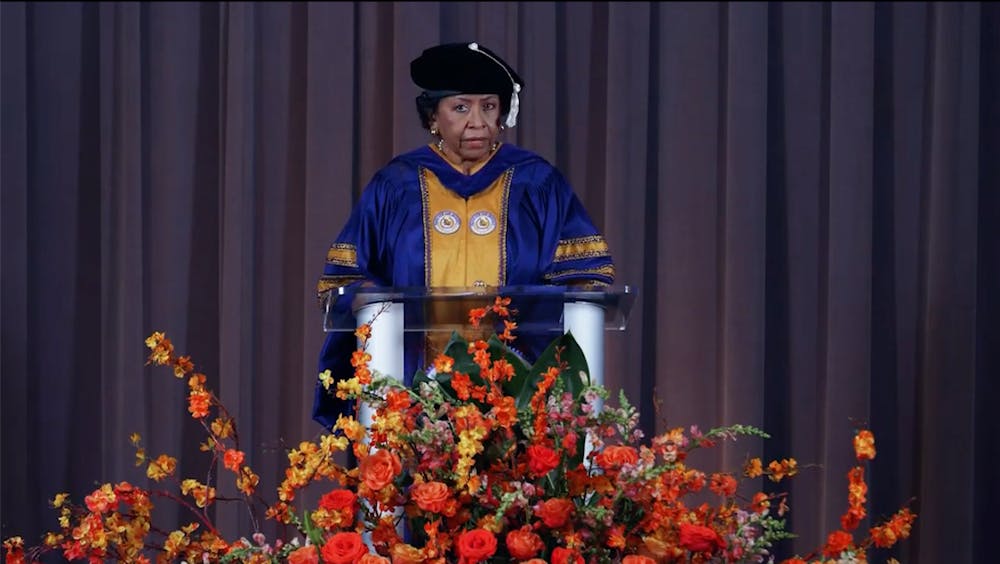Ruth Simmons, President of Prairie View A&M University, spoke at Princeton’s 2021 Baccalaureate ceremony on the importance of diversity.
University President Christopher Eisgruber ’83 began by acknowledging the virtual nature of the ceremony, speaking from an empty University Chapel.
“If we were not still grappling with the COVID-19 pandemic, this ceremony would be taking place with all of us together,” he said. “While our service must take place virtually this year given the ongoing pandemic, I am grateful for the opportunity to continue the tradition as we reflect together, though apart, on our shared values and mission.”
Eisgruber then reflected on the University motto — “in the nation’s service and the service of humanity” — and how the Class of 2021 has upheld it.
“Some of you engaged in direct service,” he said, citing community service done through the Pace Center for Civic Engagement and the work of student leaders on campus. “Others of you chose the path of advocacy, raising your voices to stand against racism and for racial equity and for justice, and to assist those in need. Many of you harnessed Princeton’s intellectual resources to conduct research on pressing issues, ranging from environmental sustainability to economic development to inequality to healthcare.”
“All of you, I hope, grew as thinkers and as citizens,” he concluded. “Now, as you prepare to make the transition from students to alumni, I hope that Princeton’s mission will continue to shape your lives.”
Following Eisgruber’s address, students from the senior class presented readings, prayers, and songs from various religious traditions.
Eisgruber then introduced Simmons as the event’s keynote speaker, citing several of her past leadership roles as President of Brown University, President of Smith College, and acting director of the Program in African American Studies at Princeton.

Simmons began her address by retracing her steps in coming to work at Princeton, and telling the story of her childhood as a daughter of sharecroppers in rural Texas during the Jim Crow era.
“Today, my siblings and I are grateful that our parents taught us how to behave in such a racial context because their doing so kept us safe and able to live to adulthood,” she said. “That might sound familiar to you if you are aware of what today’s parents must tell their children to keep them safe from racial violence.”
Simmons then spoke on the value of education, highlighting in particular the residential college system at Princeton and its ability to help students learn through difference. She also reflected on the reforms she took part in during her time as a University administrator, and showed gratitude to those who helped give her the confidence to rise to such high-profile positions.
“While interacting with difference can at times be frustrating and unsettling, it remains an unparalleled opportunity for us all,” she said.

Simmons also spoke of diversity as an asset in building mutually respectful, safe communities that care for one other through times of trial and adversity. In doing so, she pointed specifically to the current resurgence of notions of racial superiority in society, and called her audience to action in holding back this tide.
“Princeton could be the most diverse environment you experience in your lives unless you take deliberate steps to forestall a reversion to modern segregation by race and class,” she warned. “I urge you to make certain that you do not take that path. Wherever you go and whatever you do, let diversity inform and shape your life and work.”
Throughout her speech, Simmons cited instances where difference changed the world for the better — recalling that Martin Luther King, Jr. spoke at the University Chapel in 1960, preaching a practice of nonviolent protest, and how his openness to the philosophy of Mahatma Gandhi in India helped inspire the civil rights movement of the 1960s.
Urging students to think clearly, serve as a force for good, and offer goodwill and empathy toward fractured communities, Simmons acknowledged that we “need not be perfect,” but must always be “in the process of perfecting” our abilities to do good.
“It isn’t easy in this brash world to discover and retain a sense of who you want and need to be,” she said. “Treasure the confidence that you have gained here. Reach out to those who have accompanied you in this journey, and feel renewed in your determination to excel at being who you are.”
Following Simmons’ address, further interfaith prayers and readings were presented by Associate Dean of Religious Life Rev. Theresa Thames, Dean of Religious Life Rev. Alison Boden, Tilmann Herchenröder ’21, Shanaz Deen ’21, and Natashia Neckles ’21.
The ceremony took place virtually at 11 a.m. ET on Saturday, May 15.








